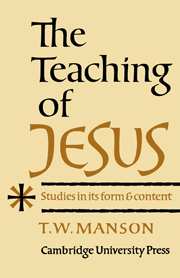Book contents
- Frontmatter
- Contents
- Preface
- LIST OF ABBREVIATIONS
- PART I PRELIMINARY QUESTIONS
- Chap. I Introduction: Problems and Methods
- Chap. II The Sources
- Chap. III Formal Characteristics of the Teaching
- Detached Note A. On Mt. xii. 28; Lk. xi. 20 (Q)
- Detached Note B. The Parable of the Wedding Feast (Mt. xxii. 1–14)
- PART II THE CONTENTS OF THE TEACHING
- Appendices I–VI
- Additional Notes
- General Index
- Reference Index
Chap. I - Introduction: Problems and Methods
Published online by Cambridge University Press: 31 March 2010
- Frontmatter
- Contents
- Preface
- LIST OF ABBREVIATIONS
- PART I PRELIMINARY QUESTIONS
- Chap. I Introduction: Problems and Methods
- Chap. II The Sources
- Chap. III Formal Characteristics of the Teaching
- Detached Note A. On Mt. xii. 28; Lk. xi. 20 (Q)
- Detached Note B. The Parable of the Wedding Feast (Mt. xxii. 1–14)
- PART II THE CONTENTS OF THE TEACHING
- Appendices I–VI
- Additional Notes
- General Index
- Reference Index
Summary
THE study of the teaching of Jesus has close affinities with two of the main branches of modern theological investigation, for, on the one hand, no attempt to write the life of Jesus, or even to sketch his likeness, could be considered complete without some account of his words: and, on the other, any work on New Testament Theology must necessarily take as its foundation the Theology of the Founder of Christianity. The study of the teaching of our Lord is a branch both of Biblical History and of Biblical Theology. These two disciplines are essentially modern: they were begotten by the Reformation, though they did not actually come to birth until the eighteenth century. In principle they were already present when Luther transformed faith from the mere acceptance of ecclesiastical dogma into a personal living trust in God through Jesus Christ. This transformation necessarily involved a change of method in dealing with Scripture, particularly the Gospel narrative, even though the extent of the change was not fully realised until a later date.
It has been said that the Reformation merely set up one infallibility in place of another, merely substituted an infallible Bible for an infallible Church. If this charge were true, it would be a serious matter: for it would be no real emancipation at all, which freed the plain man from the bondage of Scholastic metaphysics merely to deliver him into an equally rigorous servitude to a new Scholasticism made by philologists and rabbinical exegetes.
- Type
- Chapter
- Information
- Teaching of Jesus , pp. 3 - 21Publisher: Cambridge University PressPrint publication year: 1935

